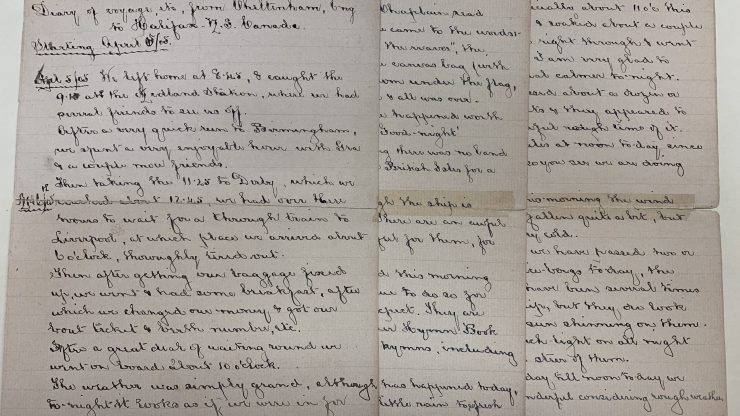A New Manuscript by Jim Hetherington – May 6, 2019
back to the Special Collections Blog

Written in 1905, an anonymous account tells us the readers how heart and gut-wrenching life at sea can be. The sailors traveled from [Chittenham], England to Halifax N.C. Canada. Amongst the icebergs, there was abundant wildlife thriving. Whales and porpoises jumped out of the water while a funeral for a death-struck little boy returned the youngling to nature as we know it. The manuscript of the diary here recollects a 1st person account. “The whole of the passengers were there & also the officers,” calling for the group to restore unanimously and not fractured by rank. Their voices rang, “& we commit this body to the waves.” What was so keen about the text is the attention to detail of the “comments on whales spouting water 15 to 20 get into the air and seeing large porpoises jumping out of the water, [all the while] passing two or three hundred ice-bergs several times as large as the ship.”
Another insight regarding life at seas is how they manage their feelings. Circa 1905, their use of bad was widely understood as to how we cope in a situation. “It is a lovely day although the ship is rolling something awful. There are an awful lot of fellows bad, I can feel for them, for I know how bad it is.” Typically bad is a punishment not an understatement. Harsh as it sounds, 300 to 400 something odd miles a day, when pushing through storms creates a mood of us versus nature. With no way to gun it faster than what was over their heads for days and days causing the ocean to swell up and wash the deck; they probably put someone in charge of the diary to keep a keen sense on where they are, were, and will be.
Then the manuscript just ends without any grand conclusive remarks or link to more from that voyage. For a major duration of the journey covered in the document, the weather was “rough” and yet they preserved with optimism as a population of “a couple hundred.” The technology existed after all the wick carburetor was patented in 1905 (when the journal began) by Frederick William Lanchester.
Note: The ship’s destination was Halifax which was the largest city in Atlantic Canada. Founded under the Kingdom of Great Britain, Halifax became an influx and host to Protestant settlers under the direction of the Board of Trade. Via the expansion across the overseas, more food and stuff boosts the economy, and a boatload of 1,600 people on that voyage will shape Halifax even more with enlivening the culture with their accent and kind gestures. What’s apparent is the young child’s burial at sea. The service was “one of the saddest rights” and a real spectacle with the wildlife teeming up and out of the Atlantic.